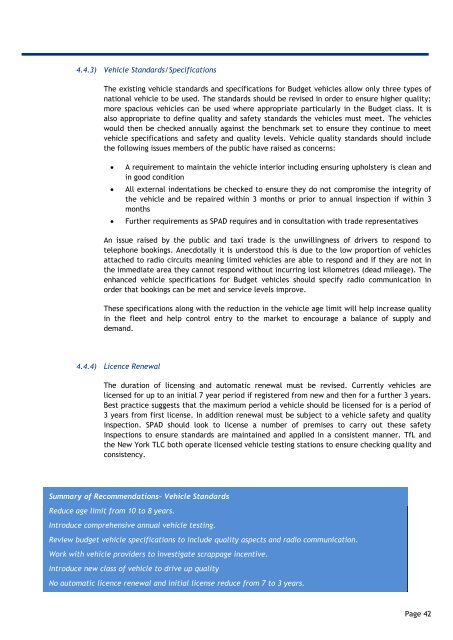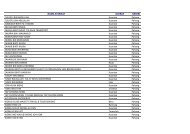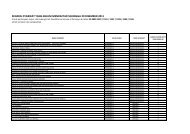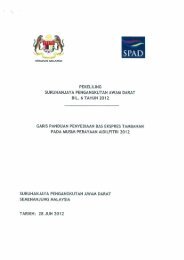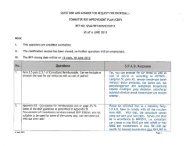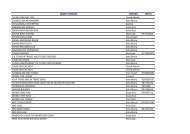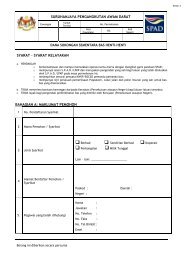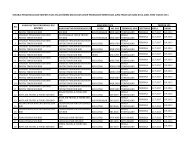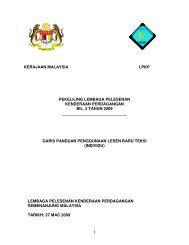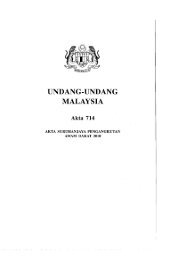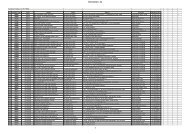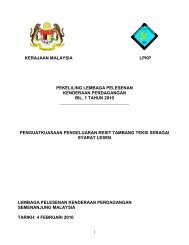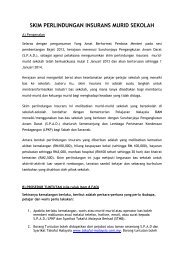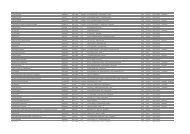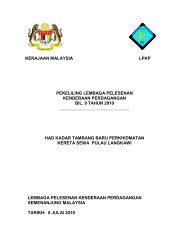4. Developing the Taxi Transformation Plan - SPAD
4. Developing the Taxi Transformation Plan - SPAD
4. Developing the Taxi Transformation Plan - SPAD
You also want an ePaper? Increase the reach of your titles
YUMPU automatically turns print PDFs into web optimized ePapers that Google loves.
<strong>4.</strong><strong>4.</strong>3) Vehicle Standards/Specifications<br />
The existing vehicle standards and specifications for Budget vehicles allow only three types of<br />
national vehicle to be used. The standards should be revised in order to ensure higher quality;<br />
more spacious vehicles can be used where appropriate particularly in <strong>the</strong> Budget class. It is<br />
also appropriate to define quality and safety standards <strong>the</strong> vehicles must meet. The vehicles<br />
would <strong>the</strong>n be checked annually against <strong>the</strong> benchmark set to ensure <strong>the</strong>y continue to meet<br />
vehicle specifications and safety and quality levels. Vehicle quality standards should include<br />
<strong>the</strong> following issues members of <strong>the</strong> public have raised as concerns:<br />
<br />
<br />
<br />
A requirement to maintain <strong>the</strong> vehicle interior including ensuring upholstery is clean and<br />
in good condition<br />
All external indentations be checked to ensure <strong>the</strong>y do not compromise <strong>the</strong> integrity of<br />
<strong>the</strong> vehicle and be repaired within 3 months or prior to annual inspection if within 3<br />
months<br />
Fur<strong>the</strong>r requirements as <strong>SPAD</strong> requires and in consultation with trade representatives<br />
An issue raised by <strong>the</strong> public and taxi trade is <strong>the</strong> unwillingness of drivers to respond to<br />
telephone bookings. Anecdotally it is understood this is due to <strong>the</strong> low proportion of vehicles<br />
attached to radio circuits meaning limited vehicles are able to respond and if <strong>the</strong>y are not in<br />
<strong>the</strong> immediate area <strong>the</strong>y cannot respond without incurring lost kilometres (dead mileage). The<br />
enhanced vehicle specifications for Budget vehicles should specify radio communication in<br />
order that bookings can be met and service levels improve.<br />
These specifications along with <strong>the</strong> reduction in <strong>the</strong> vehicle age limit will help increase quality<br />
in <strong>the</strong> fleet and help control entry to <strong>the</strong> market to encourage a balance of supply and<br />
demand.<br />
<strong>4.</strong><strong>4.</strong>4) Licence Renewal<br />
The duration of licensing and automatic renewal must be revised. Currently vehicles are<br />
licensed for up to an initial 7 year period if registered from new and <strong>the</strong>n for a fur<strong>the</strong>r 3 years.<br />
Best practice suggests that <strong>the</strong> maximum period a vehicle should be licensed for is a period of<br />
3 years from first license. In addition renewal must be subject to a vehicle safety and quality<br />
inspection. <strong>SPAD</strong> should look to license a number of premises to carry out <strong>the</strong>se safety<br />
inspections to ensure standards are maintained and applied in a consistent manner. TfL and<br />
<strong>the</strong> New York TLC both operate licensed vehicle testing stations to ensure checking quality and<br />
consistency.<br />
Summary of Recommendations– Vehicle Standards<br />
Reduce age limit from 10 to 8 years.<br />
Introduce comprehensive annual vehicle testing.<br />
Review budget vehicle specifications to include quality aspects and radio communication.<br />
Work with vehicle providers to investigate scrappage incentive.<br />
Introduce new class of vehicle to drive up quality<br />
No automatic licence renewal and initial license reduce from 7 to 3 years.<br />
Page 42


